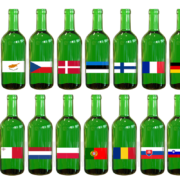The break-up of Yugoslavia was inevitable
Image by nightowl from Pixabay
The Vienna Institute for International Economic Studies (WIIW) published an interesting set of papers to mark the 30th anniversary of the break-up of Yugoslavia. This blog post will focus on the interview with Vladimir Gligorov, a senior research associate at the WIIW and son of North Macedonia’s first president Kiro Gligorov. His claims democratisation would have saved Yugoslavia leading to EU membership is what I will focus on in this post.
The democratisation of Yugoslavia was never likely
Within the country, there was no institutional framework within which to even attempt democratisation. As many have noted, given Yugoslavia was a federation, the 1974 constitution was on the weak side. The Republics and Autonomous Regions which made up the Federation all had the right to veto federal initiatives. In addition, enforcement of federal acts often occurred at this lower level. The 1974 constitution not only strengthened Tito’s personal power, but gave the Yugoslav National Army (JNA) a formal political role.[1] Namely, the JNA became the 9th member (non-voting) of the Federal presidency as part of the 1974 constitution. Not something conducive to democratisation.
Gligorov himself notes in his interview that in Yugoslavia it was “the ethnic group” that was represented in institutions. He goes on to say “[y]ou could not solve any political problem without some kind of ‘ethnic justice’.” – the pan-national idea did not even function within the League of Communists (SKJ), which even though nominally Yugoslav, had operated along Federal Republic lines something which the 8th Congress of the SKJ had enshrined all the way back in 1964[2].
It was the SKJ which maintained political balance and managed ethnic tensions, often resorting to repression through the state apparatus[3]. Given the 1974 constitution had strengthened Tito’s already strong position, his death in 1980 had an even bigger detrimental effect on Yugoslavia. His undoubted authority gone, this ushered in a decade of deadlock. In the context of this deadlock, the decisions of the Serbian Communist Party under Milošević, to annul the autonomy of Vojvodina and Kosovo in 1989 represented one stress too much on the constitutional order, administering the final rites to the SKJ which duly fell apart in January 1990.
1990 was anything but a year of hope if your hope was to keep Yugoslavia together
Given all of this, I cannot understand Gligorov’s claim 1990 was a year of hope. With the SKJ falling apart, the last possible institution which could hope to keep Yugoslavia together was gone. Yes, Marković’s economic programme filled stores with largely foreign goods and stabilised inflation. Yet, with the political system broken, hopes he could implement far more challenging reforms to generate long-term, sustainable growth were forlorn.
The only hope could have been for some sort of gradual separation. Here, those who wanted to leave could do so after satisfying certain conditions. This would have required a modicum of trust of and respect for democratic norms to succeed.
Yet, a scenario where Croatia and Slovenia departed the Yugoslav Federation under conditions similar to the divorce of the Czech Republic and Slovakia would have left Macedonia and Bosnia Herzegovina existing in a political entity far more beholden to Serbia, as Gligorov’s father and his counterparts in Bosnia Herzegovina would surely have known. Hardly an acceptable outcome given the political realities of the time.
EU membership for Yugoslavia – only in a parallel universe
I also disagree with Gligorov’s view that “[i]f Yugoslavia had decided at the time to hold democratic elections and have a new constitution, I am sure it would have been accepted as a member of the EU.”
Sure, Yugoslavia had the support of the United States and the West in general. The Truman administration decided, to the surprise of many on both sides of the Iron Curtain, to offer a large support package to Yugoslavia, seeking Congressional approval on November 14, 1951. And by the early 1980s when economic conditions seriously deteriorated, Yugoslavia received its seventh IMF support package. There is no doubt western governments paid plenty of attention to events in Yugoslavia. The last thing they needed during the Cold War was for Yugoslavia to fall apart. It represented, after all, a country which had successfully resisted Soviet efforts to rule it.
But to suggest that democratisation would have led to EU membership stretches credulity. It took Greece, Portugal and Spain, between 7 and 12 years after becoming democracies to enter the club. Not only that, all three were already members of NATO, something not all successor states to Yugoslavia are today.
Successor states’ divergent paths tell their own story
Thirty years after the break-up of Yugoslavia, there is today nothing stopping, for example, Serbia from meeting the EU’s conditions. Certainly not Croatian or Slovenian obstruction within the same political entity. Yet, Serbia continues, for example, to pursue policies of military neutrality and equally good relations with Russia, China, the EU and US.
Namely, Serbia has chosen not to unequivocally opt for the EU as Slovenia and Croatia have done. Not only that, Slovenia, as a member of the euro area and Schengen, is a member of the EU’s core. Croatia aims to join both the euro area and Schengen. Relatively soon, both will likely be core members of the EU. Hungary, Poland and the Czech Republic, by comparison, will not have gone that far.
Under which political system could a state with such diametrically opposed key political goals amongst nominal political equals ever hoped to have survived? The break-up of Yugoslavia was indeed inevitable.
[1] See Pesic, Vesna, Serbian Nationalism and the Origins of the Yugoslav Crisis, p 12
[2] ibid
[3] Pesic, p3









